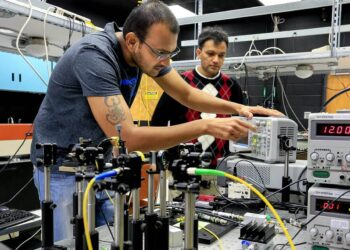If you aspire to be an engineer and are exploring various engineering fields, you have reached the right place.
In this article, we will explore the best engineering fields in pakistan, with the average salaries and possible job opportunities within each field.
Best Engineering Field in Pakistan
Here are some of the leading Engineering Fields in Pakistan with salaries:
| # | Best Engineering Field in Pakistan | Avg Salary (PKR) |
| 1 | Civil Engineering | Rs. 48,6996 |
| 2 | Aerospace Engineering | Rs.1,224,306 |
| 3 | Petroleum Engineering | Rs 1,080,000 |
| 4 | Computer Science Engineering | Rs. 2,979,412 |
| 5 | Mechanical Engineering | Rs 579893 |
| 6 | Electrical Engineering | Rs 592865 |
| 7 | Industrial Engineering | Rs 300,000 |
| 8 | Biomedical Engineering | Rs 4,200,00 |
| 9 | Chemical Engineering | Rs 485426 |
| 10 | Nuclear Engineering | Rs. 177,000 |
1. Civil Engineering

Civil engineering, a dynamic field focused on designing and executing impactful structural projects, spans grand national networks to intricate local infrastructures.
From monumental national transportation systems to the creation of neighborhood streets and residences, civil engineers shape the spaces we live in.
Their realm extends to constructing vital elements like dams, highways, water pipes, and more, with a pivotal role in adapting to evolving societal needs and environmental challenges.
Civil engineering is the art of shaping our world, from vast national networks to local streets. It encompasses constructing crucial infrastructures like dams, highways, and water pipes.
Adapting to evolving societal needs, civil engineers tackle environmental challenges by integrating renewable energy. They ensure safety in projects, from land development to infrastructure design.
With specialized roles and diverse niches such as structural, transportation, and environmental engineering, this field offers a lucrative career path.
Avg Salary: Rs 48,6996
Positions:
- Construction and Management Engineering
- Structural Engineering
- Geotechnical Engineering
- Building Engineer
- Urban Planner
2. Aerospace Engineering

Aerospace engineering encapsulates the inventive realms of aircraft and spacecraft design, construction, and evaluation. Split into aeronautical and astronautical branches, it navigates atmospheric and space travel challenges.
Aeronautical Engineering revolves around Earth’s atmospheric aircraft principles, while Astronautical Engineering centers on spacecraft creation and operation.
Requiring at least a bachelor’s, often supplemented by a master’s, aerospace engineering beckons those passionate about aerodynamics, propulsion, and avionics—the essence of rocket science—leading to dynamic roles like aircraft mechanics, data analysts, and project managers.
Avg Salary: Rs.1,224,306
Positions:
- Aerospace Technician
- Aircraft Mechanic
- Test Engineer
- Safety Engineer
- Aviation Manager
3. Petroleum Engineering

Petroleum engineering stands as a pivotal field amid the increasing value of oil and natural resources. These engineers master water, oil, and gas management, which is crucial for global resource sustainability.
Requiring a bachelor’s degree at entry, a master’s often enhances expertise in this lucrative industry; petroleum engineers are indispensable for efficient natural resource extraction and management.
They operate in varied settings—offices, labs, and field sites—ensuring safe oil and gas extraction, which is vital for global energy security. This field combines cutting-edge technology with collaborative efforts with geologists and other engineers, guaranteeing safe petroleum recovery and processing.
As esteemed professionals, petroleum engineers are highly sought-after globally, offering skills applicable not only to conventional oil and gas but also to renewable energy sectors like geothermal, carbon capture, and storage.
Avg Salary: Rs 1,080,000
Positions:
- Petroleum Geologists
- Reservoir Engineer
- Completion Engineer
- Drilling Engineers
- Production Engineer
4. Computer Science Engineering

Computer engineering is a dynamic field centered on crafting, evolving, and sustaining both computer software and hardware.
Encompassing vital subjects like programming languages, algorithms, and computer networks, it differs from software engineering, fusing electrical engineering with computer science to create experts handling tangible hardware.
These engineers shape the very components underpinning our daily digital reliance. A bachelor’s degree in computer science, programming, or electrical engineering forms the cornerstone for success in this realm.
Computer Science Engineering is expected to have a 7% job growth forecast till 2030; driven by technological strides, computer engineers contribute to research labs, manufacturing sites, and offices. They’re instrumental in enhancing and innovating the computing devices we interact with daily.
Areas within computer engineering span Artificial Intelligence, Aerospace software, Autonomous systems, Big Data analysis, and various roles like web and game development, showcasing the broad spectrum and future potential of this thriving field.
Avg Salary: Rs. 2,979,412
Positions:
- Artificial Intelligence
- Aerospace software
- Autonomous systems
- Big Data analysis
- Web development
- Game development
5. Mechanical Engineering

Mechanical engineering drives the design, evolution, and upkeep of mechanical systems, delving into thermodynamics, materials science, and structural mechanics.
Focused on objects with moving parts, these engineers navigate a spectrum of disciplines, from materials science to structural analysis. With a mandatory bachelor’s degree and a penchant for continuous learning, mechanical engineers command an average salary of $88,175, reaching over $130,394 for top performers.
Operating across automotive, aerospace, and energy sectors, they shape a promising job market with a projected 7% growth till 2030.
Operating from offices to research hubs, these engineers persistently innovate, enhancing the efficiency and efficacy of machines and mechanical systems, making mechanical engineering a ubiquitous, versatile, and vital field impacting every facet of modern life.
Avg Salary: Rs 579893
Positions:
- Test Engineer
- Project Engineer
- Mechanical Design Engineer
- Systems Engineer
6. Electrical Engineering

Electrical engineering dives into electricity, electronics, and electromagnetism, encompassing power systems, digital electronics, and more. Application of math and physics to electrical components and utilization.
This field spans diverse specialties like power generation, transmission systems, batteries, motors, and control systems. Branching into areas like radiofrequency systems, telecommunications, and signal processing, electrical engineering offers a vibrant scope in remote sensing, instrumentation, and optoelectronics.
From electricians to hardware engineers, the field offers varied career paths.
Requiring a bachelor’s degree with ABET accreditation and often supplemented by graduate studies, electrical engineers drive innovation in energy, electronics, and automation.
Their roles span offices, labs, and industrial sites, contributing significantly to advancing and sustaining the electrical systems powering our modern world.
Avg Salary: Rs 592865
Positions:
- Controls Engineer
- Project Engineer
- Communications Engineer
- Systems Engineer
7. Industrial Engineering

Industrial engineering encompasses multifaceted projects spanning diverse industries like automotive, manufacturing, supply chain logistics, ergonomics, and product development.
These engineers function at the nexus of engineering and management, striving to enhance systems and refine processes for optimal efficiency.
Focusing on manufacturing industrial or consumer goods, industrial engineers venture into varied disciplines.
Their tasks range from bolstering efficiency and trimming production costs to elevating quality control, safeguarding employee health and safety, ensuring environmental protection, and compliance with regulatory standards.
At its core, industrial engineering aims to innovate and streamline operations across industries, fostering advancements while meeting societal and regulatory obligations.
Avg Salary: Rs 300,000
Positions:
- Manufacturing Technician
- Industrial Designer
- Quality Assurance Inspector
8. Biomedical Engineering

Biomedical engineering intertwines engineering principles with biological sciences, addressing medical challenges by designing devices, systems, and software for diagnosing, treating, and preventing ailments.
This field serves as a critical liaison between engineering and medicine, innovating tools for monitoring, diagnosing, and healing medical conditions.
Equipped with expertise in biology, chemistry, and engineering, biomedical engineers command an average salary of $90,241, with top earners surpassing $130,000.
With a robust 6% job growth forecast from 2020 to 2030, these professionals are instrumental in hospitals, research facilities, or medical equipment companies, playing a pivotal role in advancing patient care and pioneering state-of-the-art medical technologies.
Bioengineering stands as a promising frontier, merging innovation with healthcare to transform and improve lives.
Avg Salary: Rs 4,200,00
Positions:
- Biomaterials Developer
- Manufacturing Engineer
- Rehabilitation Engineer
9. Chemical Engineering

Chemical engineering harnesses math, biology, chemistry, and physics to revolutionize chemical production. From pharmaceutical drugs to food and petroleum, these engineers develop cutting-edge manufacturing methods crucial for effective water treatment and nuclear power usage.
Operating in academia and commerce, they transform materials into diverse products, including plastics and synthetics.
The job market requires expertise in math, chemistry, physics, and economics, alongside a bachelor’s degree in chemical engineering (with potential for a master’s).
Anchored by laboratories, manufacturing hubs, or offices, they spearhead sustainable material development and processes, pivotal for a cleaner and more efficient future.
This dynamic field converges innovation with scientific prowess, shaping transformative solutions across various industries, from pharmaceuticals to energy and food processing.
Avg Salary: Rs 485426
Positions:
- Biotechnologist
- Chemical Engineer
- Colour Technologist
- Energy Engineer
- Nuclear Engineer
- Petroleum Engineer
- Product/Process Development Scientist
10. Nuclear Engineering

Nuclear engineering navigates the intricate realm of designing and constructing nuclear reactors, managing their operations, and studying radiation’s effects on materials and systems, along with developing nuclear fuel cycles.
This diverse discipline draws from various physics fields, resembling aerospace engineering in its reliance on simulation and modeling for complex system evaluation.
Despite being among the best-paying engineering careers, the field forecasts an 8% job decline till 2030, yet it remains promising. Approximately 900 yearly job opportunities are projected over the next decade.
Nuclear engineering encapsulates the science and utilization of nuclear and radiation processes, spanning research, industry, medicine, and national security.
Rooted in fundamental physics and mathematics principles, it’s a multidimensional field merging physics branches and simulation techniques critical for designing and analyzing vast, intricate systems.
Avg Salary: Rs. 177,000
Positions:
- Health and Safety Specialist
- Instrumentation and Control Engineer
- Process Engineer
- Project Manager
- Quality Engineer
- Reactor Operator
Start Your Engineering Journey Today!
So that was our list of leading engineering fields in Pakistan. Check out more content on education, scholarships, and universities on BlogPakistan.















